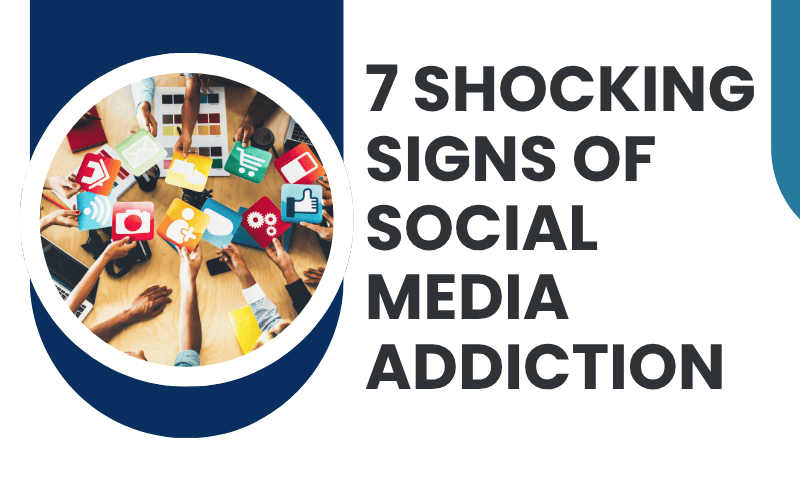Social media addiction is secretly controlling more women’s lives than we’d like to admit, babe. If you’ve ever found yourself mindlessly scrolling at 2 AM wondering where the last three hours went, or felt genuine panic when your phone battery dies, you’re definitely not alone. According to recent statistics, 40% of Americans aged 18-22 and 37% of those aged 23-38 self-report being addicted to social media, and honey, those numbers are only climbing.
Let’s get real about social media addiction – what it actually looks like, why it happens, and most importantly, how to break free from its grip. Because girl, you deserve to live your actual life, not just document it for the ‘gram.
What Actually Is Social Media Addiction? (And Why We’re All Vulnerable)
Before we dive into the nitty-gritty, let’s talk about what social media addiction really means. It’s not just about spending a lot of time online – we all do that. Social media addiction is when your usage becomes compulsive, interferes with your real life, and you feel genuinely distressed when you can’t access your accounts.
Conservative estimates suggest that roughly 10% of Americans are addicted to social media, which translates to over 33 million people. But here’s what’s really wild – an estimated 27% of children who spend 3 or more hours a day on social media exhibit symptoms of poor mental health. And let’s be honest, how many of us adults are spending way more than three hours scrolling?
The thing about social media addiction is that these platforms are literally designed to be addictive. They use the same psychological techniques as casinos – variable reward schedules that keep you coming back for more. Every like, comment, and share releases a little hit of dopamine, creating a cycle that can be incredibly hard to break.
Think about it: when was the last time you opened Instagram or TikTok with a specific purpose and actually stuck to it? Most of us open these apps mindlessly, then find ourselves in a rabbit hole of content we never intended to consume. That’s not a personal failing – that’s brilliant, manipulative design working exactly as intended.

Okay, let’s get honest about the signs of social media addiction. I’m going to share some scenarios, and I want you to really think about whether they sound familiar. No judgment here – we’re all figuring this out together.
1. Time Disappears When You’re Scrolling You tell yourself you’re just going to “quickly check” your feeds, and suddenly it’s been two hours. This time distortion is one of the most common signs of social media addiction. You genuinely lose track of time because the endless scroll is designed to keep you in a trance-like state.
2. You Feel Genuine Anxiety When You Can’t Check Your Accounts If your phone dies or you don’t have wifi, do you feel restless, anxious, or irritable? Research shows that many people experience anxiety when unable to access their social media accounts. This withdrawal-like response is a major red flag for social media addiction.
3. Your Real-Life Responsibilities Are Suffering Maybe you’re checking Instagram during work meetings, scrolling TikTok instead of spending quality time with your partner, or staying up way too late because you can’t put your phone down. When social media addiction starts interfering with your job, relationships, or self-care, it’s time to pay attention.
4. You’re Constantly Comparing Yourself to Others Social media addiction often goes hand-in-hand with comparison syndrome. You find yourself feeling inadequate after scrolling, jealous of other people’s seemingly perfect lives, or feeling like you’re not doing enough. Research shows that life satisfaction decreases with social media addiction, as people use these platforms as substitutes for real-life fulfillment.
5. You Check Your Phone Compulsively – Even Without Notifications Do you reach for your phone automatically, even when you haven’t heard any alerts? This unconscious checking behavior is a classic sign of social media addiction. Your brain has been trained to seek out that dopamine hit regularly.
6. Your Sleep Is Suffering Whether you’re scrolling before bed (hello, blue light exposure) or waking up in the middle of the night to check your feeds, social media addiction can seriously mess with your sleep quality. And we all know how crucial good sleep is for literally everything else in our lives.
7. You Feel FOMO Constantly The fear of missing out drives so much of our social media addiction. You feel like you need to stay constantly updated, like something important might happen if you’re not online. This creates a cycle where you’re always consuming but never truly present in your own life.
Why Social Media Addiction Hits Women Especially Hard
Let’s talk about something that doesn’t get discussed enough – how social media addiction affects women differently. We’re often socialized to seek external validation and maintain social connections, which makes us particularly vulnerable to these platforms’ manipulation tactics.
Social media feeds into so many pressures we already face: the need to look perfect, document every moment, maintain an image of having it all together. The comparison trap is especially brutal for women because we’re constantly bombarded with filtered, curated versions of other women’s lives.
Plus, many of us use social media as our primary way of staying connected with friends and family. It feels necessary, not optional, which makes recognizing social media addiction even more challenging. How do you cut back on something that feels essential to your social life?
The Real Impact of Social Media Addiction on Your Life
The effects of social media addiction go way beyond just “wasting time” (though let’s be real, time is precious). Research has linked excessive social media use to increased rates of depression, anxiety, and loneliness. Teens spending over five hours daily on social media are 70% more likely to contemplate suicide – and while that’s an extreme example, it shows how serious this issue can be.
Social media addiction also affects our ability to focus and concentrate. When your brain is constantly seeking that next hit of validation or entertainment, it becomes harder to engage in deeper, more meaningful activities. Reading a book, having an uninterrupted conversation, or even just sitting with your thoughts becomes increasingly difficult.
There’s also the physical impact. Hours of scrolling mean hours of poor posture, eye strain, and reduced physical activity. Plus, the sleep disruption from late-night social media use affects everything from your immune system to your mood regulation.

How to Break Free from Social Media Addiction: Your Recovery Roadmap
Ready to take control back? Breaking free from social media addiction doesn’t necessarily mean going completely offline – it’s about developing a healthier, more intentional relationship with these platforms.
Start with Awareness The first step in addressing social media addiction is getting honest about your usage. Check your screen time reports (they’re probably more shocking than you think). Notice when you reach for your phone automatically. Pay attention to how you feel before, during, and after social media sessions.
Set Clear Boundaries Studies show that limiting social media use to 30 minutes a day resulted in significant reductions in anxiety, depression, loneliness, sleep problems, and FOMO. Start by setting specific times when you’ll check social media, and stick to them. Maybe it’s 15 minutes in the morning and 15 minutes in the evening.
Create Phone-Free Zones and Times Designate certain areas of your life as phone-free. This might mean no phones during meals, keeping your phone out of the bedroom, or having a “no social media before noon” rule. These boundaries help break the automatic reaching-for-phone habit.
Find Alternative Activities The key to overcoming social media addiction is filling that time and energy with things that actually fulfill you. What did you love doing before you spent hours scrolling? Reading, exercising, cooking, crafting, calling friends? Make a list and start incorporating these activities back into your life.
Curate Your Feeds Mindfully If you’re not ready to drastically reduce your social media use, at least make sure what you’re consuming adds value to your life. Unfollow accounts that make you feel bad about yourself. Follow accounts that inspire, educate, or genuinely make you happy. Your social media addiction will be less harmful if the content is actually beneficial.
Building a Healthy Relationship with Social Media
The goal isn’t to demonize social media entirely – these platforms can provide genuine value when used intentionally. They can help us stay connected with loved ones, discover new ideas, build communities, and even grow businesses. The key is using them as tools rather than letting them use you.
Think about social media addiction recovery like any other addiction recovery – it’s about progress, not perfection. You might have days where you slip back into old patterns, and that’s okay. What matters is that you’re becoming more aware and making conscious choices about how you want to engage with these platforms.
Consider doing a social media detox for a week or even just a weekend. Notice how you feel. What do you do with that extra time? How does your mood change? This can give you valuable insight into how social media addiction has been affecting your life.
Remember, you have the power to choose how you interact with technology. Social media addiction might feel overwhelming right now, but with the right strategies and support, you can absolutely develop a healthier relationship with these platforms.
When to Seek Professional Help for Social Media Addiction
Sometimes, social media addiction is too entrenched to handle alone, and that’s completely okay. If your usage continues to interfere with your work, relationships, or mental health despite your best efforts, it might be time to seek professional support.
Research shows that specific symptoms of social media addiction like mood modification, withdrawal, and conflict have stronger connections with depression and anxiety. A therapist who specializes in digital wellness or behavioral addictions can provide personalized strategies and support.
Don’t wait until social media addiction has completely taken over your life. If you’re reading this and recognizing yourself in these patterns, you’re already taking the first step toward change. You deserve to live a life where you’re fully present and engaged, not constantly distracted by your phone.
Your relationship with social media doesn’t have to control you, babe. With awareness, boundaries, and the right support, you can break free from social media addiction and reclaim your time, attention, and energy for the things that truly matter. You’ve got this! 💪✨




